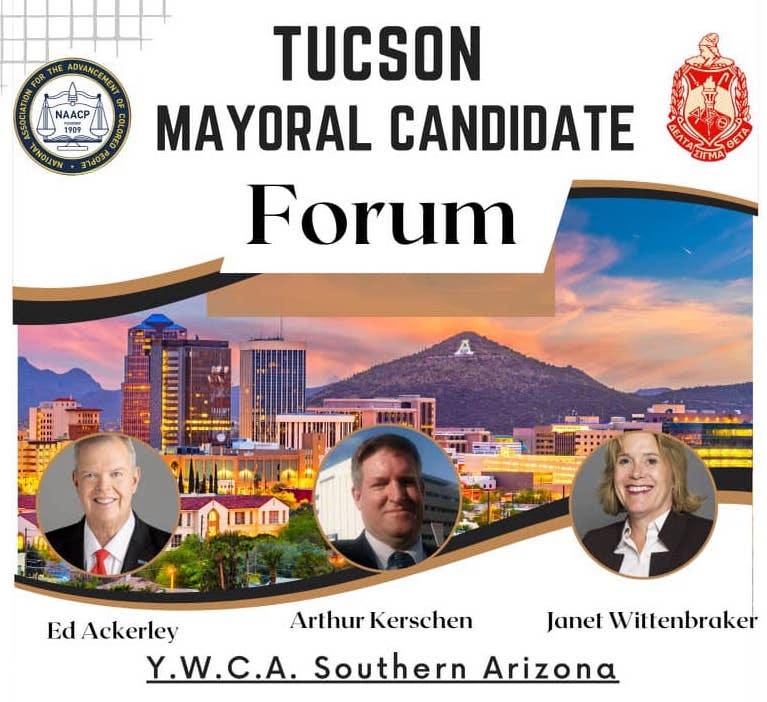The Daily Agenda: Mayoral challengers throw down
The good, the bad and the awkward … Rezoning kerfuffles abound ... Mexico's presidential election starting to take shape.
The three challengers in Tucson’s mayoral race fielded some tough questions at an NAACP and Delta Sigma Theta forum last month that was marked largely by confusion, non-answers and a few moments that were just plain awkward.
Independent Ed Ackerley, Republican Janet Wittenbraker and Libertarian Arthur Kerschen showed up ready to talk about their platforms — though not necessarily ready to answer the questions moderators asked. More than once, moderators had to re-phrase questions after candidates failed to address the topic during their first response.
Mayor Regina Romero didn’t attend the forum, which focused largely on issues that disproportionately affect African Americans, but she might have outperformed most of the pack by virtue of not saying anything stupid.
Chances are, none of these challengers are going to win. But we wanted to give you the chance to hear what they’re saying in one of the few mayoral forums of this election cycle, and the only one we know of explicitly speaking to Black issues.
While the candidates didn’t seem prepared to answer questions centering around Black issues at a forum hosted by African American-based organizations, Ackerley made a solid point about the need for political diversity on Tucson’s city council.
“When you have a 7-0 council… that really defeats the purpose of two-party government,” Ackerley said. “We’re having one-sided discussions and not listening to the rest of the people that perhaps need to be listened to.”
Here’s a breakdown of some of the more noteworthy questions and answers:
Engaging the Black community
Wittenbraker told the crowd that while she grew up in a racist home, there isn’t a racist bone in her body. She said the first thing she’d do is ask Tucson’s Black community how they feel underrepresented and she’d engage constituents in conversations about race and equity.
Ackerley leaned into his platform of economic development, public safety and cleaning up city parks. He wants to bolster the use of school resource officers to help engage children of color and foster a good relationship with police, as well as increase recruitment and retention of police officers of color. The only groups of people he wanted to see singled out in Tucson are “lawless criminals causing havoc in the community,” he said.
Kerschen said that eliminating discrimination needs to be part of the culture, but that he didn’t think there should be laws to prevent people from being bigoted. He told the audience he didn’t believe there should be laws that single out people by race or heritage, but that everyone should be treated equally.
“Part of freedom is the right to have people insult you and be able to deal with it,” he said. “Freedom of speech, even if it’s offensive speech, is part of the foundation of America.”
Drugs and support programs
Wittenbraker said that while the city has a responsibility to protect the rights of citizens and provide services, helping people with mental illness and drug addiction isn’t part of that responsibility.
“There’s a fine line between compassion and enabling,” she said, adding that she would look to partner with local businesses to assist people with addiction or mental health issues, but would not address those at taxpayers’ expense.
Ackerley said as mayor, he’d work with the council, the county, state and federal governments to address the problem of addiction and mental illness, noting the federal pandemic funds that have been used to fund social workers and other positions to address mental health and addiction issues would soon be running out.
Kerschen said strictly enforcing existing laws for crimes like shoplifting and trespassing would make substance users — who he called both criminals and victims — seek treatment “or get a real job” to fund their addiction. But in true Libertarian fashion, he didn’t seem to believe drugs should even be illegal.
“We don’t ban guns, but we teach firearm safety,” he said.
Working with the Tucson Unified School District
Wittenbraker said that while the mayor has no jurisdiction over TUSD, city employees can still play a role in improving local education by getting into classrooms and working as volunteers, encouraging good study habits and showing students the value of completing their education.
“It’s not my job, but I’d love to see it change because children are our future,” she said, laughing when she realized she’d echoed the lyrics of a popular song. “Is that a Michael Jackson song?”
The audience quickly corrected her that it was Whitney Houston, to which Wittenbraker replied, “If it’s not Neil Diamond or contemporary Christian,” it isn’t on her playlist.
“Oh my goodness. Neil Diamond?” said one audience member.
Ackerley talked about the importance of advocating for literacy and creating good jobs, so that kids will want to finish school and join Tucson’s workforce. He said the mayor plays a role in making sure the community supports its schools and teachers.
Kerschen put the blame for lagging test scores on school shutdowns during the pandemic and what he said were teachers who chose to teach from home.
“When you give people the option to get paid without doing any work, they’re going to choose to get paid without doing any work,” Kerschen said.
You can watch the forum here:
House rules: State law gives neighbors of new housing developments an unfair, built-in advantage when it comes to rezoning, the Arizona Daily Star’s Tim Steller writes. In this case, the planned 326-unit development on the former Quail Canyon golf course prompted some neighbors to complain, which means the project now needs a super-majority vote when the Pima County Board of Supervisors vote on it on Tuesday.
Speaking of rezoning: Rio Rico residents are worried about become a mining town if a major landowner gets local officials to rezone a 9-mile stretch that includes 3,550 acres along Interstate 19, the Arizona Daily Star’s Henry Brean reports. An Australian mining company is planning a $1.7 billion zinc and manganese mine in the nearby mountains. The proposed rezoning was the subject of packed public meetings last month, the Nogales International’s Angela Gervasi reported. The rezoning was going to be put up for a vote this week, but county officials cancelled the meeting after the uproar from local residents.
Two reporters’ salaries are equal to a tiny fraction of the money being spent to develop a mine. Help us reach our goal.
Whoops: Local Democratic Party officials may have committed an unforced error when they failed to properly notify the public about their meeting on Saturday to decide who they think should replace state Rep. Andrés Cano, the Tucson Sentinel’s Jim Nintzel and Dylan Smith report. Cano is stepping down so he can pursue a master’s degree at Harvard. To choose his replacement, precinct leaders in Legislative District 20 select three candidates and the county supervisors appoint someone from that list. But party officials didn’t tell the public about the meeting, so the supervisors may have to follow a different, weeks-long process to select Cano’s replacement.
Fallout from SCOTUS decision: The University of Arizona’s chief enrollment officer and dean of undergraduate admissions was interviewed for the Washington Post’s Early 202 newsletter on the heels of the Supreme Court’s Thursday decision prohibiting race from being used in college admissions. This ruling doesn’t affect Arizona students though, because voters in 2010 passed a state law that banned affirmative action in admission decisions. Kasey Urquidez spoke about the impact to the UA of the law, including the school’s growth in diversity, outreach efforts to continue to recruit diverse students, their decision to consider hardship in decisions regarding admission and the university’s use of private donors or private dollars to assist students of specific backgrounds.
After AMLO: Voters in Mexico are starting to see frontrunners emerge for next year’s presidential election, including Sen. Xochitl Galvez of the conservative PAN party, Kendal Blust of KJZZ’s Fronteras Desk reports. The MORENA party of President Andrés Manuel López Obrador, who cannot run again, is setting up a process to select its candidate.
Feather frenzy: Tucson Unified School District Superintendent Gabriel Trujillo issued a public apology to a former student who was forced to remove a sacred eagle feather from his cap before the graduation ceremony in late May, KGUN reports. Trujillo said in a statement that the request from Tucson High's administration for the student to surrender the feather was "inappropriate” and an inaccurate interpretation of TUSD policy. Gov. Doug Ducey signed a law in 2020 banning school districts from barring Native American students from wearing tribal regalia like eagle feathers during graduation ceremonies because of similar incidents at other schools.
June was hot, but it wasn’t as hot as the past few years. The Tucson area hit 100 degrees on 17 days in June, compared to 24 days in June of last year. The National Weather Service in Tucson puts the normal number of 100-degree days for June at 21.








Love your reporting.